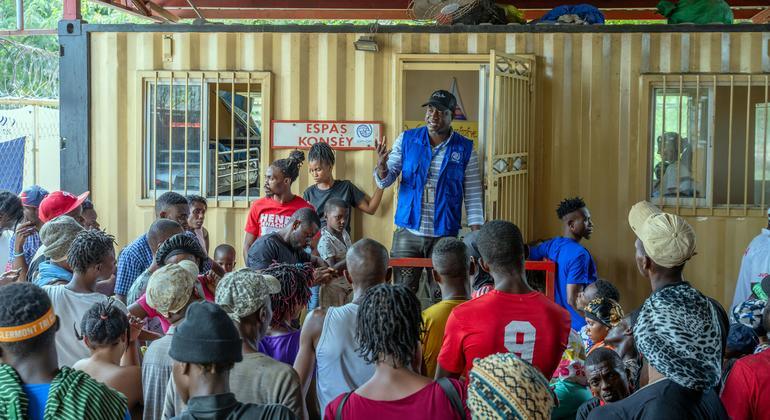According to the UN migration agency, IOM, in recent weeks has experienced an increase in the deportation of women, including those who are pregnant or breastfeeding, as well as children and newborn babies.
The agency has emphasized the increased risks facing these groups that return to Haiti, where access to basic services remains very limited.
On Tuesday alone, IOM staff at the Belladère boundary transition in Haiti 416 received deported, including 11 pregnant women and 16 women still breastfeeding.
Meet the needs
“While IOM -teams are not present during the deportation process itself, their efforts are focused on deported needs on arrival, of which many arrive at uncertain and very vulnerable conditions, often without resources“Said UN spokesman Stéphane Dujarric, talking in New York.
He explained that IOM provides immediate humanitarian assistance, including food, water and hygiene, as well as first aid, medical referrals and psychosocial support.
Particular attention is paid to mothers’ health, and temporary places to live are arranged for women breastfeeding when needed, he added.
Aggravated relationships
Mr. Dujarric also updated about the situation in Haiti, where rising violence and recent cuts in funding undermine important services and aggravate the humanitarian situation, especially in the center department.
Escaling of violence from armed groups has triggered mass expulsion with More than 51,000 people, over half of them children fleeing from recent attacks. Many are now stranded in provisional places or seek security in other regions.
No security inside hospitals
He noted that University Hospital of Mirrebalais – an important referral facility with about 300 beds – has suspended the operations after a wave of uncertainty in the area.
“Armed attacks, a mass prison breach and destruction of public infrastructure forced the hospital to gradually shut down. Before its closure, it served almost 850 patients every day, including through maternal care and advanced cancer treatment,” he said.
Meanwhile, two other hospitals come in the area – St. Therese in Hinche and Albert Schweitzer Hospital in Artibonite – now under increased burden and is facing critical deficiency, including oxygen and emergency medicine sets.
Since the closure of the University Hospital in Mirrebalais, they have treated more than 200 patients for gunshot wounds, stroke, suspected cholera and malnutrition.
“St. Therese alone has received more than 3,500 internally displaced people – tripled his policinical caseload,” said Mr. Dujarric.
The UN Children’s Fund (UNICEF) and humanitarian partners work to relieve pressure on the health system in the center department.
Mobile clinics are deployed to reach 30,000 people in host communities and shear camps in coordination with the Haitian authorities and the Catholic charity Caritas.
Humanitaries are looking for $ 908 million to support nearly four million people in Haiti this year. Only six percent of funding, $ 57 million, has been received to date.



